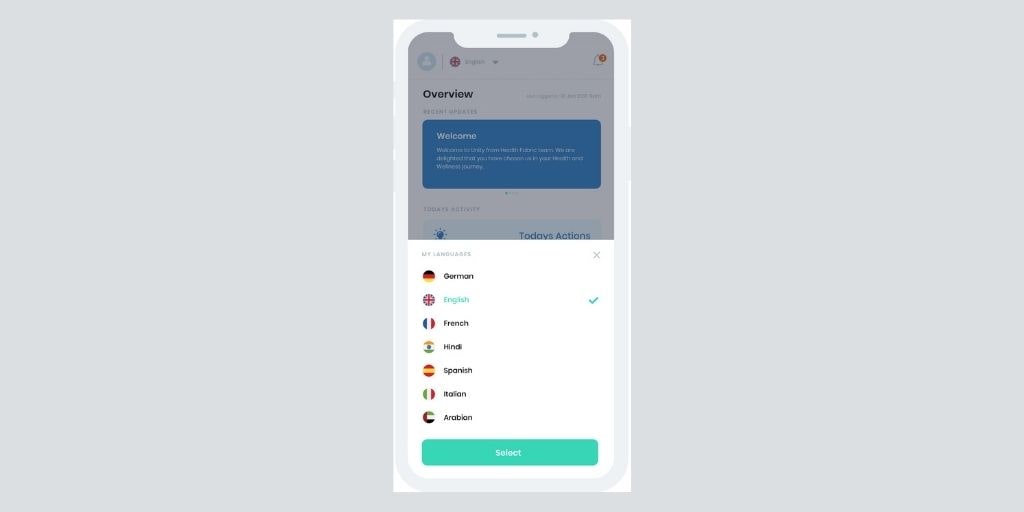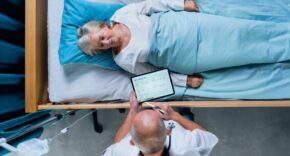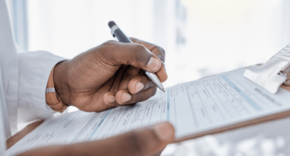
An app is being launched to help patients with long term conditions manage their health via care plans accessed on their phone. Unity, by mobile health provider, Health Fabric, will be licensed by participating GP practices, which can then offer the system to patients so they can be more proactive in their care.
The app provides NHS and approved supplier care plans for conditions such as high blood pressure, COPD, asthma, diabetes, hypertension, angina and depression. For patients with multiple conditions, tailored care plans can be developed and provided by the GP.
The app is available in 15 languages: Bengali, English, French, German, Gujarati, Hindi, Italian, Polish, Portuguese, Punjabi, Russian, Somali, Spanish, Turkish and Ukrainian.
Health Fabric worked with Crown Medical Practice in Tamworth to develop Unity, which uses the latest technologies, such as artificial intelligence. The company had previously released a healthcare monitoring app, MyHealthFabric, which was shortlisted for an EHI Award in 2017 (the awards organiser, eHealth Insider publication, is now Digital Health).
Dr Paul Joshi, a GP at Crown Medical Practice, believes the new app will bring many benefits to patients and the NHS. “I think Unity will be extremely useful to patients who want to be more proactive in the way they manage their health,” he said.
“The more conditions someone has, the more complicated their care is, but if they can follow a care plan on their phone, they can see what they need to do, and when they record symptoms, their GP can see how they’re getting on.”
He added: “Throughout Covid, we’ve seen that a lot of people who don’t speak English very well have had disproportionately more health problems. They might have been getting information from unreliable sources when they’ve not been able to engage with their GP. With Unity being available in many different languages, it should be easier for them to understand how they can manage their care.”
Through the app, patients can input readings such as their blood pressure and blood sugar levels, asthma peak flow figures, oxygen saturation levels, and more. They are also prompted to answer questions on how well they are managing their symptoms and can record their mood using emoticons.
Using AI and machine learning, Unity recognises what the baseline of symptoms are for each patient and can ascertain where there are anomalies. If a patient doesn’t record any statistics or indicate their mood, or if the readings are ‘abnormal’, an alert is sent to the GP practice that something might be wrong, enabling their doctor to take action. Family members, carers and friends can also be alerted to any issues, if the patient has given them access to their app login.
“It’s an easy-to-use system, with graphics and icons, and it can be reassuring for families to see that their relative has input a smiley face to show that they’re feeling well,” said Joshi. “But if something doesn’t seem right, it means that the family have visibility of what might be happening and can quickly take action to try and sort it out.”
A 2018 study supported by the National Institute for Health Research predicted that, by 2035, two-thirds of adults aged over 65 would be living with multiple health conditions. It found that 17% would have four or more diseases – double the number of people living with so many comorbidities in 2015. And one-third of these would have a mental illness such as dementia or depression.
The study also pointed to an ageing population living longer with comorbidities; and coupled with a rise in obesity-related disease in younger people, the overall effect is of increased pressure on health and social care services.
Satnam Bains, founder of Health Fabric, began to develop Unity in 2019. “As technology has advanced, I realised there was more that could be done to help people,” he said.
He was spurred on after seeing a report by Public Health England in August 2020 that showed that people of Bangladeshi origin had twice the risk of death of Covid-19 in comparison to white British people, and that people of Chinese, Indian, Pakistani, other Asian, Black Caribbean or other Black ethnicity had between 10% and 50% higher risk of death.
“I saw that there was an opportunity to help people for whom English is not their first language. We need to improve health literacy and reduce health inequalities. I want to help different communities understand what they can do to improve the quality of their lives. For example, with cultural traditions when eating sugary food is part of religious festival celebrations, I want people to see that it is not good for them if they suffer from long term conditions such as diabetes.”
He added: “If people can manage their own conditions better, this means fewer trips to hospital, so it’s better for them, and beneficial for the NHS and social care services as it will reduce costs and improve health outcomes.”
Health Fabric gained some funding from Innovate UK to develop Unity. There are a variety of licence options for GP practices to consider, and thereafter patients will be able to download the app free of charge; family and friends will have access to a free trial for two months and will subsequently be offered a subscription service. The app will be available across more conditions and languages in future iterations.












